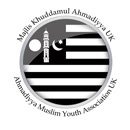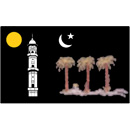Why did Hazrat Ahmad claim to be different things at different times?
Another objection that is raised is why did Hazrat Mirza Ghulam Ahmad, may peace be upon him, claim to be a Mujaddid, then the Promised Messiah, then the Mahdi, then a Prophet and then many other Prophets etc. Why didn’t he inform his followers that he was all these titles from the beginning, why wait until they had joined his community and then start revealing these claims one after another?
Hazrat Mirza Ghulam Ahmad, may peace be upon him, can only claim something after he has been informed by Allah. He cannot and must not make false claims, especially when they are concerning Allah. Otherwise he will cause the displeasure of Allah and Allah has made it clear that he will not allow anyone to forge and attribute any saying to Him.
The Holy Qur’an states:
And if he had forged and attributed any saying to us,
We would surely have seized him by the right hand,
And then surely we would have severed his life-artery,
And not one of you could have held us off from him.
Holy Qur’an, chapter 69, verses 45-48
We see the example of the Holy Prophet Muhammad, may peace and blessings of Allah be upon him, that he only claimed to be a Prophet once informed by Allah. If fact he wouldn’t make any real decision without first being informed by Allah. When he wanted to migrate to Medina, he waited until Allah gave him permission, before he set out. Likewise we see the example of John the Baptist, may peace be upon him, who when confronted by the Jews as to whether he was Elijah, he denied it:
And he confessed, and denied not, but confessed, I am not the Christ. And they asked him (John) ‘what then? Art thou Elias (Elijah)?’ And he saith ‘I am not.’ Art thou that prophet? And he answered ‘no’.
The Holy Bible, John 1, verses 20-21
But later on, when Jesus was asked ‘why then say the scribes that Elias must first come? Jesus responded ‘Elias is come already’…Then the disciples understood that he spake unto them of John the Baptist. (St. Matthew 17:10-13).
From this we understand that when John was asked, Allah hadn’t informed him that he was the second coming of Elias, therefore he denied it. But later on, Allah had informed Jesus that John the Baptist, may peace be upon him, was indeed the second coming of Elias.
Therefore it is only once Allah has informed you, can you then inform others.
In March 1882, Hazrat Mirza Ghulam Ahmad, may peace be upon him, received revelations like:
God bless thee, O Ahmad…The Gracious God has taught thee the Qur’an so that you should warn the people whose ancestors have not been warned… Proclaim: I have been commissioned and I am the first of the believers…
which made him realise that Allah had appointed him as the Mujaddid of the fourteenth century of Islam. At this stage he did not make any specific public claim; his status as the Promised Messiah was yet to be revealed to him in another eight years.
However, he did intensify his prayers and worship and devoted all this time towards his writings and preaching the truth and the excellence of Islam.
Six years after being appointed as a Reformer, Hazrat Mirza Ghulam Ahmad, may peace be upon him, was commanded by Allah to start taking the Bai’at, the oath of allegiance. He said:
I have been commanded that the seekers after truth should enter into covenant of Bai’at with me for the purpose of learning the way of true faith, true purity and the love of the Lord and of discarding an evil, slothful and disloyal life.
Announcement on green paper, 1st December 1888
In early 1890, Allah revealed to Hazrat Mirza Ghulam Ahmad, may peace be upon him, that Jesus Christ had died a natural death and that the belief that he was still alive in heaven is false. Up to this time, he, himself, held the belief that Jesus was physically alive in Heaven, but after studying the Holy Qur’an and Holy Bible, he discovered 30 proofs from each book to support this claim. Upon the realisation that Jesus was dead and would not return, he then started to understand why Allah was referring to him as Jesus (i.e. “We have made thee the Messiah, son of Mary”) and thus announced that he was the Promised Messiah and Mahdi.
Therefore it is only after Allah had revealed to him that he was these personages, that he then made the claim.
Now concerning the objection that why did he refer to himself to be a reflection of all the Prophets? Hazrat Mirza Ghulam Ahmad, may peace be upon him, explained his claim of being the manifestation of the prophets and the champion of Allah in the mantles of the prophets. He said:
This revelation means that I have been bestowed some portion of the special circumstances or special qualities of all the prophets, peace be upon them, who have appeared from God beginning with Adam till the end, whether they were Israelis by descent or non-Israelis. There has not been a single prophet of whose qualities or circumstances I have not been bestowed a portion… In this there is an indication that many people of this age resemble the bitter enemies and opponents of the prophets,peace be upon them, who had exceeded the limits in their rancour and who were destroyed by various types of torments… There has also been displayed and will be displayed in the future the various types of aid and support which God Almighty had displayed in the case of the previous prophets.
Braheen Ahmadiyya, Part V, pg 89
It is clear from this quotation that Hazrat Mirza Ghulam Ahmad, may peace be upon him, spoke about spiritual qualities and reflection of previous prophets and facing the same sort of opposition as the previous prophets. Again he explained his spiritual likeness with the Holy Prophet, may peace and blessings of Allah be upon him, and said:
They are so honoured as God finds them utterly devoted to the Holy Prophet, so much so that they become like a clear mirror for the reflection of those blessings. The praise bestowed on them by Allah and the signs and blessings and effects that are manifested by them in reality belong to the Holy Prophet himself and issue from him. In truth and in its perfection that praise is appropriate only to the Holy Prophet and he is its perfect example, but as he who completely follows the practice of the Holy Prophet becomes a reflection of that illumined personality on account of his complete obedience and utter devotion, the divine lights that are manifested in that holy personality are also exhibited in his reflection.
Braheen Ahmadiyya, Part III, pg 242

















